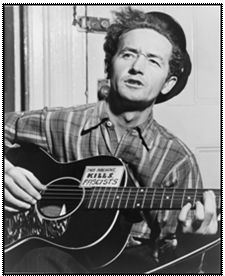
July 14, 1912 – October 3, 1967
you gotta walk that lonesome valley
you gotta walk it by yourself
nobody here can walk it for you
you gotta walk it by yourself
Quote: Woody Guthrie © 1963 (renewed) and 1977 by TRO-Folkways Music Inc.
These lines, nicked from Woody’s ‘Lonesome Valley’, are included in my song ‘Risk Of Explosion’. However he frequently ‘borrowed’ words and melodies from existing songs, and adapted the words of an old gospel number for this one which in turn had been taken from Psalm 23, often called ‘The Lord Is My Shepherd’ or ‘A Psalm of David’.
Yea, though I walk through the valley of the shadow of death,
I will fear no evil; for thou art with me;
Thy rod and staff they comfort me
MB: Woody Guthrie was my most important early influence - not only for his writing (songs, books and much else) but also his attitudes and lifestyle. He also had a huge influence on hundreds of others, from 1950s folkies to punk rock and beyond.
For all his lyrics, biography, current events, news and contacts, etc, go to: The Woody Guthrie Archives, 125-131 East Main Street, Suite # 200, Mt Kisco, N.Y.10549, USA. www.woodyguthrie.org/archives
See also the film: ‘Man in the Sand’ (1999, Union Productions), a music documentary that chronicles the collaboration between Billy Bragg and Wilco, which involved the musicians creating new music to accompany lyrics that were written decades earlier by folk singer Woody Guthrie. The project, which was organized by Woody's daughter Nora, spawned two albums: Mermaid Avenue, released in 1998, and Mermaid Avenue Vol. II, released in 2000. Many other musicians have also since been involved in this project.


Books by Woody include ‘Bound For Glory’,
his incredibly energetic and moving autobiography, and ‘Born To Win’,
a collection of articles, poems and other pieces.
There are hundreds of excellent quotes from Woody, but this is perhaps the most apt with regards song writing.
‘I hate a song that makes you think that you are not any good. I hate a song that makes you think that you are just born to lose. Bound to lose. No good to nobody. No good for nothing. Because you are too old or too young or too fat or too slim too ugly or too this or too that. Songs that run you down or poke fun at you on account of your bad luck or hard traveling. ... I am out to fight those songs to my very last breath of air and my last drop of blood. I am out to sing songs that will prove to you that this is your world and that if it has hit you pretty hard and knocked you for a dozen loops, no matter what color, what size you are, how you are built, I am out to sing the songs that make you take pride in yourself and in your work. And the songs that I sing are made up for the most part by all sorts of folks just about like you. I could hire out to the other side, the big money side, and get several dollars every week just to quit singing my own kind of songs and to sing the kind that knock you down still farther and the ones that poke fun at you even more and the ones that make you think you've not any sense at all. But I decided a long time ago that I'd starve to death before I'd sing any such songs as that. The radio waves and your movies and your jukeboxes and your songbooks are already loaded down and running over with such no good songs as that anyhow.’
Statement quoted in Prophet Singer: The Voice And Vision of Woody Guthrie (2007) by Mark Allan Jackson. There are a few slight variants of this statement, which seems to have originated in a performance monologue.
‘This Land Is Your Land’ was written in 1940, recorded by Woody Guthrie 1944, based on an existing melody. It was composed in response to Irving Berlin’s ‘God Bless America’ which Woody found ‘unrealistic and complacent’. The melody was very similar to, ‘Oh My Loving Brother’, a Baptist gospel hymn recorded by the Carter family as, ‘When The World’s On Fire’, which had also inspired their ‘Little Darlin’ Pal of Mine’. However, Woody’s song had a different melodic structure from all these and he used only the first half of these other melodies in his tune. Woody wrote and sang a number of variations to the verses over time, for various reasons. The song has been covered by many artists, most notably in the 1960s by Bob Dylan, The Kingston Trio, The New Christy Minstrels, Peter Paul and Mary, etc. In more recent days artists recording it include, Bruce Springsteen, Counting Crows and Sharon Jones & The Dap-Kings, among others. The song has also been used by electioneering politicians; movie and TV programme makers; also in schools, colleges and churches, etc.